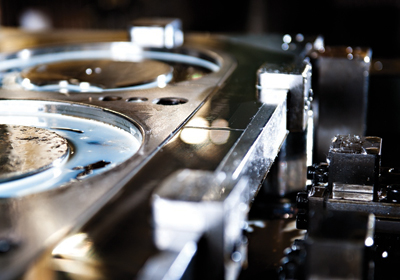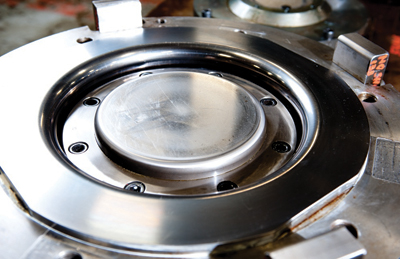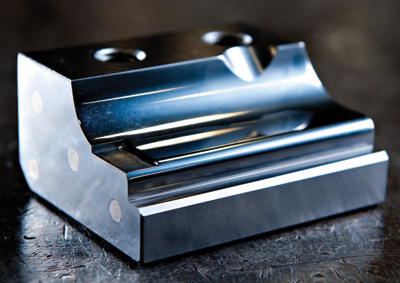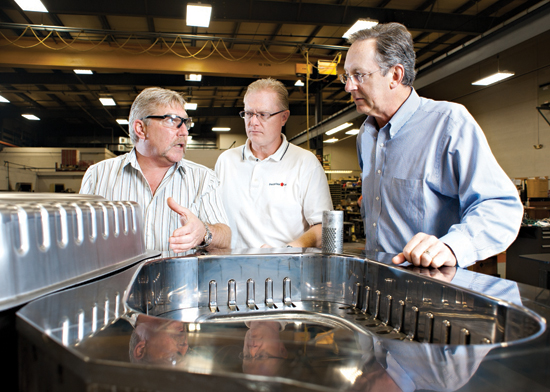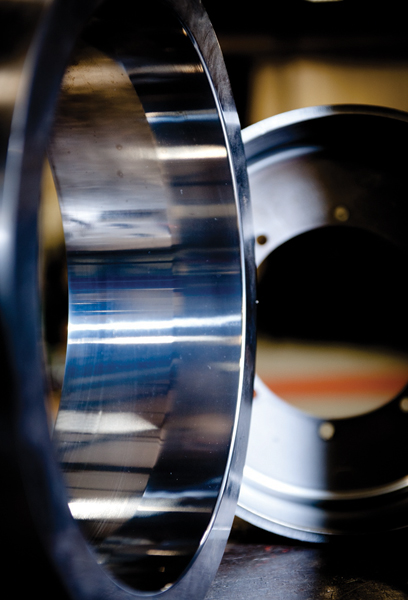Ideal Tool Protection
The selection of Phygen for the deep-draw details resulted from a previous tool-coating quest.
“About seven years ago we started looking for coatings for tooling used to stamp large brake drums from 1025 and 1026 high-strength low-alloy steel,” recalls Stull. “We experienced excessive galling that only allowed us to produce 900 parts before having to repolish and clean the details. We tried all types of coatings without any improvement.”
Searching for an answer, Pentaflex shipped precision die sleeves—large details with tolerances maintained at ±0.0005 in.—to Phygen. The tool coater applied its FortiPhy process—which creates a thin and dense nanocrystalline coating structure that adheres to virtually any tool-steel substrate—to the rings. The coating process creates highly energetic nanoparticles, reportedly resulting in a higher level of adhesion—three times higher—than is possible with conventional coating processes. The coating also boasts a low coefficient of friction, less than 0.1 in typical lubricated conditions.
A previously tested coating, which only brought an uninterrupted tool life of 900 hits, would fail owing to an adhesion process that would pull out carbon from the tools, according to Stull. The FortiPhy coating, on the other hand, uses a process that doesn’t deplete the tools’ carbon grains.
In addition, the coating process offered another feature that caught Stull’s attention. While chemical-vapor-deposition and thermal-diffusion coatings typically are applied at temperatures exceeding 1800 F, FortiPhy requires significantly lower temperatures. This lessens the chance of distortion that can play havoc with tolerances, and minimizes tool-hardness concerns.
“After employing the FortiPhy process, we went from polishing details after 900 hits to surpassing 40,000 hits before required maintenance,” says Stull. “In the past seven years we’ve coated a number of tools with this process, mostly of DC53 material and some D2. For the large drums, we use A2 due to the high ironing pressures during forming—requiring a minor amount of expansion within the tools to prevent them from fracturing. The coating process and heattreating does lower the Rockwell hardness a bit, but doesn’t distort the tools. We send them out at Rc 60-62, and after coating they come back at Rc 58-59, well within their working range.”
Coating a Surer Bet Close to Home
With a toolroom roster of 11 employees across two shifts, focusing mostly on tool maintenance and repair with a bit of build, Pentaflex appreciates tooling that lasts over the long haul. Finding coatings that keep tools producing help the company service its growing tractor-trailer customer base. A few years back, Pentaflex made business decisions that revealed how critical the correct coating can be to maintaining top-notch production.
“At one time we had details produced overseas to reduce costs,” recalls Stull. “Those suppliers could only recommend thermoreactive-diffusion coatings for these details. But these coatings failed to hold up given the type of work we perform and the types of tool steels we use. So we purchased the details coating-free and shipped them to Phygen for the correct coating. Now we source all of our tooling domestically, and combining that with ideal coating performance, we produce parts that meet our customers’ needs.” MF
Article provided by Phygen Coatings, Inc.: 888/749-4361; www.phygen.com.View Glossary of Metalforming Terms
See also: PHYGEN
Comments
Must be logged in to post a comment. Sign in or Create an Account
There are no comments posted. Finishing
FinishingInline Addition of Corrosion Inhibitor for Galvanized Welded...
Tuesday, July 9, 2024
 Finishing
FinishingDayton Rogers Adds Powder Coating Division
Wednesday, June 19, 2024






